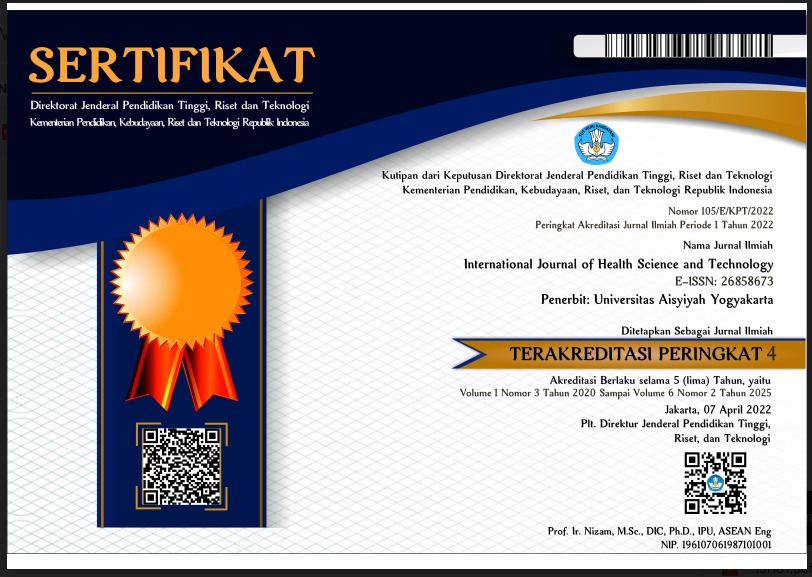Anxiety and Maternal Fetal Attachment
DOI:
https://doi.org/10.31101/ijhst.v2i2.1850Abstract views 972 times
Keywords:
Anxiety, Maternal Fetal Attachment, PregnancyAbstract
References
Abasi, E., Tahmasebi, H., Zafari, M., &Takami, GN. (2012). Assesment on effective Factots of maternal-Fetal Attachment in pregnant Woman. Life Science Journal Volume 9 No 3, 68-75.
Alder, J., Fink, N., Bitzer, J., Hösli, I., & Holzgreve, W. (2017). Depression and anxiety during pregnancy: A risk factor for obstetric, fetal and neonatal outcome? A critical review of the literature. Journal of Maternal-Fetal and Neonatal Medicine, 20(3), 189–209.
Andriana, E. (2011). Melahirkan Tanpa Rasa Sakit dengan Metode Relaksasi HypnoBrithing.Jakarta: PT Bhuana Ilmu Populer.
Biaggi, A., Conroy, S., Pawlby, S., & Pariante, C. M. (2016). Identifying the women at risk of antenatal anxiety and depression: A systematic review. Journal of Affective Disorders, 191, 62–77.
Fauziyyah, A.I. (2016). Hubungan antara Tingkat Kecemasan Ibu dalam menghadapi Persalinan Terhadap Skor Indonesian Version of Prenatal Attachment Inventory (IPAI) pada Ibu Hamil Trimester III di Puskesmas Tegalrejo Yogyakarta.Skripsi: Universitas Aisyiyah Yogyakarta.
Karmaliani, R., Asad, N., Bann, C. M., Moss, N., McClure, E. M., Pasha, O., … Goldenberg, R. L. (2009). Prevalence of anxiety, depression and associated factors among pregnant women of Hyderabad, Pakistan. International Journal of Social Psychiatry, 55(5), 414–424.
Kang, Y. T., Yao, Y., Dou, J., Guo, X.,& Li, S. Y. (2016). Prevalence and risk factors of maternal anxiety in late pregnancy in China. International Journal of Environmental Research and Public Health, 13(5).
Kwon, M. K., & Bang, K. S. (2011). Relationship of prenatal stress and depression to maternal-fetal attachment and fetal growth. Journal of Korean Academy of Nursing, 41(2), 276–283.
Mandagi, D. V. V., Pali, C., & Sinolungan, J. S. V. (2013). Perbedaan Tingkat Kecemasan Pada Primigravida Dan Multigravida Di Rsia Kasih Ibu Manado. Jurnal E-Biomedik, 1(1), 197–201.
Nasreen, H. E., Kabir, Z. N., Forsell, Y., & Edhborg, M. (2011). Prevalence and associated factors of depressive and anxiety symptoms during pregnancy: A population based study in rural Bangladesh. BMC Women’s Health, 11.
Novitasari, T., Budiningsih, T. E., & Mabruri, M. I. (2013). Keefektivan Konseling Kelompok Pra-Persalinan Untuk Menurunkan Tingkat Kecemasan Primigravida Menghadapi Persalinan. Developmental and Clinical Psychology, 2(2), 62-70.
Novriani, W. S.,& Febria, S. (2017). Dukungan Keluarga dengan Kecemasan Menjelang Persalinan Trimester III. Jurnal Ipteks Terapan, Vol. 11, No. 1
Pieter, Z. H., &Namora, L. L. (2011). Pengantar Psikologi Untuk Kebidanan. Jakarta: Kencana.
Pisoni, C., Garofoli, F., Tzialla, C., Orcesi, S., Spinillo, A., Politi, P., … Stronati, M. (2014). Risk and protective factors in maternal-fetal attachment development. Early Human Development, 90, S45–S46.
Pellerone, M., & Miccichè, S. (2014). Prenatal Attachment and Anxiety: Women Who Decide to Try in Vitro Fertilization and Women Who Procreate Naturally. Psychology Research, 4(6), 419–427.
Sandman, C. A., Davis, E. P., Buss, C., & Glynn, L. M. (2011). Prenatal programming of human neurological function. International Journal of Peptides.
Simpson, J. A., & Rholes, W.S. (2010). Attachment and Relationships: Milestones and Future Directions. Journal of Social and Personal Relationships, 27, 173-180.
Spitz.,& Elisabeth. (2013). Anxiety Symptoms and Coping Strategies in the Perinatal Period. BMC Pregnancy & Childbirth,Vol. 13, No. 233
Sukriani, W. (2018). Faktor Risiko Berhubungan dengan Skor Maternal-Fetal Attachment pada Ibu Hamil. Jurnal Kesehatan, 9(2), 185-191.
Suryaningsih, E.K. (2015). Indonesian Version of Prenatal Attachment Inventory(PAI) : A Preliminary Study.Skripsi: National Taipei University of Nursing and Health Sciences.
Wahyuntari, E., Listyaningrum, T.H., & Istiyati, S. (2018). Buku Ajar Kehamilan dan Maternal Fetal Attachment. Yogyakarta: Unisa Yogya.
Wahyuntari, E., Listyaningrum, T.H., & Istiyati, S.(2019). Faktor yang berpenmgaruh Terhadap maternal fetal attachment. Media Ilmu Kesehtan, 8 (2), 141-146
Yarcheski, A., Mahon, N. E., Yarcheski, T. J., Hanks, M. M., & Cannella, B. L. (2009). A meta-analytic study of predictors of maternal-fetal attachment. International Journal of Nursing Studies, 46(5), 708–715.
Downloads
Published
How to Cite
Issue
Section
License
International Journal of Health Science and Technology allows readers to read, download, copy, distribute, print, search, or link to its articles' full texts and allows readers to use them for any other lawful purpose. The journal allows the author(s) to hold the copyright without restrictions. Finally, the journal allows the author(s) to retain publishing rights without restrictions
- Authors are allowed to archive their submitted article in an open access repository
- Authors are allowed to archive the final published article in an open access repository with an acknowledgment of its initial publication in this journal

This work is licensed under a Creative Commons Attribution-ShareAlike 4.0 Generic License.










